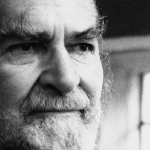I
He whom we anatomized
‘whose words we gathered as pleasant flowers
and thought on his wit and how neatly he described things’
speaks
to us, hatching marrow,
broody all night over the bones of a deadman.
My tongue is a curve in the ear. Vision is lies.
We saw is so and it was not so,
the Emperor with the Golden Hands, the Virgin in blue.
(—A blazing parchment,
Matthew paris his kings in blue and gold.)
It was not so,
scratched on black by god knows who,
by God, by God knows who.
In the dark in fetters
on bended elbows I supported my weak back
hulloing to muffled walls blank again
unresonant. It was gone, is silent, is always silent.
My soundbox lacks sonority. All but inaudible
I stammer to my ear:
Naked speech! Naked beggar both blind and cold!
Wrap it for my sake in Paisley shawls and bright soft fabric,
wrap it in curves and cover it with sleek lank hair.
What trumpets? What bright hands? Fetters, it was the Emperor
with magic in darkness, I unforewained.
The golden hands are not in Averrhoes,
eyes lie and this swine’s fare bread and water
makes my head wuzz. Have pity, have pity on me!
To the right was darkness and to the left hardness
below hardness darkness above
at the feet darkness at the head partial hardness
with equal intervals without
to the left moaning and beyond a scurry.
In those days rode the good Lorraine
whom english burned at Rouen,
the day’s bones whitening in centuries’ dust.
Then he saw his ghosts glitter with golden hands,
the Emperor sliding up and up from his tomb
alongside Charles. These things are not obliterate.
White gobs spitten for mockery;
and I too shall have CY GIST, written over me.
remember, imbeciles and wits,
sots and ascetics, fair and foul,
young girls with little tender tits,
that death is written over all.
Worn hides that scarcely clothe the soul
they are so rotten, old and thin,
or firm and soft and warm and full—
fellmonger Death gets every skin.
All that is piteous, all that’s fair,
all that is fat and scant of breath,
Elisha’s baldness, Helen’s hair,
is Death’s collateral:
Three score and ten years after sight
of this pay me your pulse and breath
value received. And who dare cite,
as we forgive our debtors, Death?
Abelard and Eloise,
Henry the Fowler, Charlemagne,
Genée, Lopokova, all these
die, die in pain.
And General Grant and General Lee,
Patti and Florence Nightingale,
like Tyro and Antiope
drift among ghosts in Hell,
know nothing, are nothing, save a fume
driving across a mind
preoccupied with this: our doom
is, to be sifted by the wind,
heaped up, smoothed down like silly sands.
We are less permanent than thought.
The Emperor with the Golden Hands
is still a word, a tint, a tone,
insubstantial-glorious,
when we ourselves are dead and gone
and the green grass growing over us.
II
Let his days be few and let
his bishoprick pass to another,
for he fed me on carrion and on a dry crust,
mouldy bread that his dogs had vomited,
I lying on my back in the dark place, in the grave,
fettered to a post in the damp cellarage.
Whereinall we differ not. But they have swept the floor,
there are no dancers, no somersaulters now,
only bricks and bleak black cement and bricks,
only the military tread and the snap of the locks.
Mine was a threeplank bed whereon
I lay and cursed the weary sun.
They took away the prison clothes
and on the frosty nights I froze.
I had a Bible where I read
that Jesus came to raise the dead—
I kept myself from going mad
by singing an old bawdy ballad
and birds sang on my windowsill
and tortured me till I was ill,
but Archipiada came to me
and comforted my cold body
and Circe excellent utterer of her mind
lay with me in that dungeon for a year
making a silk purse from an old sow’s ear
till Ronsard put a thimble on her tongue.
Whereinall we differ not. But they have named all the stars,
trodden down the scrub of the desert, run the white moon to a schedule,
Joshua’s serf whose beauty drove men mad.
They have melted the snows from Erebus, weighed the clouds,
hunted down the white bear, hunted the whale the seal the kangaroo,
they have set private enquiry agents onto Archipiada:
What is your name? Your maiden name?
Go in there to be searched. I suspect it is not your true name.
Distinguishing marks if any? (O anthropometrics!)
Now the thumbprints for filing.
Colour of hair? of eyes? of hands? O Bertillon!
How many golden prints on the smudgy page?
Homer? Adest. Dante? Adest.
Adsunt omnes, omnes et
Villon.
Villon?
Blacked by the sun, washed by the rain,
hither and thither scurrying as the wind varies.
III
Under the olive trees
walking alone
on the green terraces
very seldom
over the sea seldom
where it ravelled and spun
blue tapestries white and green
gravecloths of men
Romans and modern men
and the men of the sea
who have neither nation nor time
on the mountains seldom
the white mountains beyond
or the brown mountains between
and their drifting echoes
in the clouds and over the sea
in shrines on their ridges
the goddess of the country
silverplated in silk and embroidery
with offerings of pictures
little ships and arms
below me the ports
with naked breasts
shipless spoiled sacked
because of the beauty of Helen
precision clarifying vagueness;
boundary to a wilderness
of detail; chisel voice
smoothing the flanks of noise;
catalytic making whisper and whisper
run together like two drops of quicksilver;
factor that resolves
unnoted harmonies;
name of the nameless;
stuff that clings
to frigid limbs
more marble hard
than girls imagined by Mantegna ...
The sea has no renewal, no forgetting,
no variety of death,
is silent with the silence of a single note.
How can I sing with my love in my bosom?
Unclean, immature and unseasonable salmon.






Comment form: